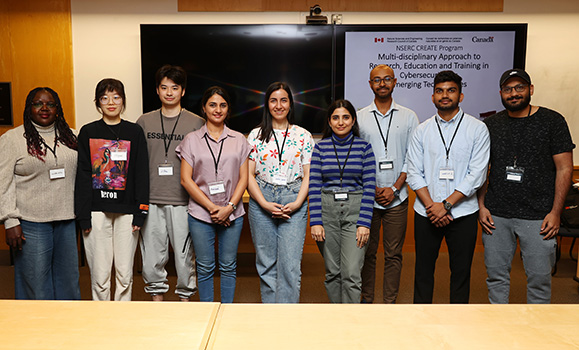A team of researchers led by Dalhousie’s Dr. Srinivas (Srini) Sampalli has been awarded $1.6 million from the federal government to train close to 200 students in cybersecurity for emerging technologies.
Over the next six years, the program — called “A Multi-disciplinary Approach to Research, Education and Training in Cybersecurity for Emerging Technologies ” — will train highly qualified personnel at the undergraduate, master's, PhD and post-doctoral levels.
“New technologies bring new vulnerabilities, but technology alone cannot solve this problem,” said Dr. Sampalli, professor and 3M National Teaching Fellow in the Faculty of Computer Science. “We must incorporate cyber policy, cyber law, and cyber ethics.”Â
The result, he said, will be students ready to join the workforce who are adequately prepared to address a global cybersecurity skills shortfall.
Dr. Sampalli said key elements will include predicting, detecting, and preventing cyberattacks, as well as integrating technological solutions with cyber-policy, ethics and governance, and fostering strong partnerships between academia and industry.Â
The program is multidisciplinary in scope, bringing together researchers from Dalhousie’s Faculties of Computer Science, Science, and Management, Dal’s MacEachen Institute for Public Policy and Governance, and Memorial University in Newfoundland and Labrador.Â
"This program is truly a team effort," said Dr. Sampalli. "It’s the combined expertise and collaboration across disciplines that will drive the success of our initiative."
The six-year initiative, funded by the Natural Sciences and Engineering Research Council of Canada (NSERC)’s Collaborative Research and Training Experience (CREATE) grant program, was announced at an event on campus on Wednesday (Oct. 2).
Cybersecurity challenges
Cybersecurity is the practice of protecting digital devices, systems, networks, programs, and individuals from attacks such as phishing, malware, and other deliberate attempts to steal, expose, alter, disable, or destroy data through unauthorized access.Â
“Cyber-attacks are becoming increasingly sophisticated,” said Dr. Sampalli. “They can range from identity theft and data breaches to large-scale attacks on a nation's critical infrastructure, such as power plants and health-care facilities.”
Many smart devices are connected through what’s known as the Internet of Things (IoT). These physical objects — such as smart home security systems, thermostats, or medical wearables — are equipped with sensors, software, and other technologies to connect and exchange data. While these devices enhance convenience and functionality, they are also increasingly vulnerable to cyberattacks, raising concerns about the security of our connected world.
Dalhousie President Kim Brooks attended the launch event and stressed the value of research and training such as this.Â
“As the head of an institution who stays up at night worrying about cybersecurity issues, the importance of what you’re about to do cannot be overstated,” she said. “Mitigation is paramount, and I can’t wait to see what this team comes up with.”

Dal President Kim Brooks.
Why does this program matter?
Of course, cyberattacks are not limited to IoT devices, and Dr. Sampalli says this NSERC funding will allow his team to develop education and training that emphasizes cybersecurity readiness across the IoT, quantum security, 5G/6G networks, generative artificial intelligence and critical infrastructure.
“Dr. Sampalli and his multidisciplinary team are embarking on an initiative that highlights the profound strength of collaboration across academia, industry, and government,” said Dr. Alice Aiken, Dalhousie's vice president of research and innovation. “This program doesn’t just push the boundaries of cybersecurity innovation — it prepares a new generation of experts to defend Canada’s digital future.”
Merging industry and academia
The initiative is supported by key industry partners Calian Group Ltd, a diverse global company recognized as one of Canada’s leaders in cybersecurity, and Field Effect, a fast-growing cybersecurity product and services startup with roots in Canada’s cyber intelligence community. Calian is making this research-based investment toward addressing a key skills development and training gap and in part, to meet its obligations under the Government of Canada's Industrial and Technological Benefits (ITB) Policy. Â
At the event, Terri Dougall, vice president of ESG and Industrial Development at Calian, emphasized the value of collaboration.Â
“These partnerships will give trainees access to cutting-edge technology, high-quality technical training from cybersecurity experts, and opportunities to apply their learning in real-world settings through co-ops and internships,” she said.

Terri Dougall.
Building on this, Kevin de Snayer, vice president of Canada, IT and Cyber Solutions at Calian, highlighted the broader impact of the program.
"This program is critical in addressing the growing cybersecurity skills shortage. By equipping trainees with hands-on experience and advanced technical training, we are not only filling a gap in the workforce but also preparing the next generation of cybersecurity professionals.”
Monique Bardawil, director of professional services at Field Effect, said cyber threats affect large- and small-scale businesses indiscriminately.Â
“Cybercrime is no longer just an inconvenience, and it doesn’t discriminate,” she said. “And cybersecurity is not just a technological field. It’s great to see an interdisciplinary effort that takes into account advances as well as challenges.”
Student experience
At the heart of the NSERC CREATE program is the mentorship and training experience for students.Â
"The students form the core of this initiative," said Dr. Sampalli. "By focusing on their development through mentorship and hands-on training, we are preparing them to lead the future of cybersecurity."Â
The program is designed to immerse students in real-world experiences, enabling them to work closely with academic and industry experts, while honing the skills necessary to tackle the ever-evolving challenges in cybersecurity.Â
 Dal students at the launch event.
Dal students at the launch event.
Dr. Sampalli expressed his deep gratitude to NSERC for their generous funding, industry partners Calian and Field Effect for significant cash and in-kind support, and Dalhousie’s Faculty of Computer Science, and the VPRI office for their matching cash contributions,Â
"Thank you all for your unwavering support and commitment to making this program a reality," said Dr. Sampalli.
“In the long term, we aim to establish ourselves as a hub for cybersecurity research and training in emerging technologies, ultimately contributing to a robust pipeline of skilled professionals in cybersecurity across Canada.”
See project collaborators below:
Faculty of Computer Science: Drs. Nur Zincir-Heywood, Evangelos Milios, Rita Orji, Qiang Ye, Israat Haque, and Yujie Tang.
Faculty of Science: Dr. Peter Selinger.
Faculty of Management: Dr. Binod Sundararajan.
MacEachen Institute for Public Policy and Governance: Dr. Kevin Quigley,
Memorial University's Department of Electrical and Computer Engineering:Â Dr. Jonathan Anderson
BryneWallace LLP, Ireland:Â Jon Legorburu

